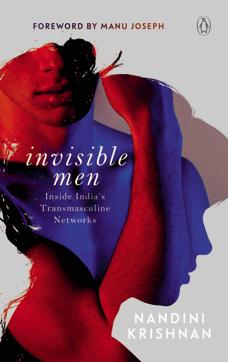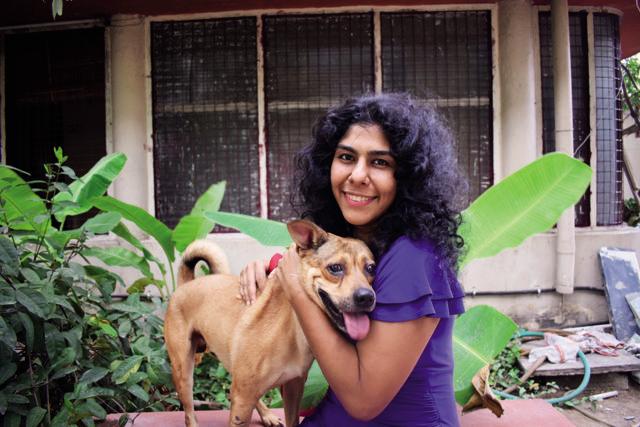Excerpt: Invisible Men by Nandini Krishnan
While Invisible Men looks with empathy at the many issues that female-to-male transgenders face, the author does not shy away from calling out the sexism of some Indian transmen

Driving home from my first encounter with transmen in ten years, I wondered how I had seen them. Would I have laughed with them when they spoke of pinching the waists of women, when they spoke of slapping girlfriends, if they had been cismen? Did I feel sorry for them? Did I not see them as wholly male? Did I dismiss the possibilities of sexual violence from them because they lacked the organ most women have been taught to dread?
It was something that would constantly occur to me in the years I spent on the book. Why could I overlook such crude statements from transmen? I rather liked Jovin, for all his brashness, and I felt there were layers to him that were not easily discernible at first sight. But could that be an excuse?
Perhaps my interviewees’ accounts of the violence they had faced made me sympathetic enough to forgive several transgressions, which I would not have in a cisman. Perhaps it also had something to do with the apparent youth of transmen, particularly pre-transition. The Peter Pan-like appearance could make Peter Pan-like behaviour acceptable.
Once, a transman told me he would only date a woman who had never dated before.
‘Who wants jootha?’ he said, using a word that is hard to translate. ‘Jootha’ is typically used to refer to leftover food or water that has been sipped. The implication is that by being tasted, the item in question has been soiled by saliva and spoiled for everyone else.
One of the issues that are being increasingly discussed in LGBTQIA circles is sexism among transmen.
Read more: Transgenders to be recognised as independent gender category in PAN form
Delfina, a volunteer with Nirangal, a non-profit for advancing the rights of individuals with alternate gender and sexual identities, told me, ‘I am in no position to make generalized observations about all transmen, but based on my personal experience of limited interactions with a close-knit community of transmen who frequent activist and support spaces, I do have some things to say. I have worked with transmen who have quite some visibility and influence among the activist and support spaces for LGBT people in Madras, and I think most are inspired by toxic models of masculinity, which are very extreme, unrealistic, and harmful — the portrayal of men that we see in mainstream cinema. You typically have a man who can do anything and everything he wants to and women are supposed to implicitly obey him.’
They—Delfina identifies as non-binary and uses the pronoun ‘they’—had once overheard a transman bragging to others about how several girls were in love with him, and he was leading all of them on. Delfina asked him whether he had a girlfriend, and it turned out he did. ‘So I asked, “How many boys do you think your girlfriend should flirt with?” And he said, “She should not set her eyes on anyone other than me . . . naan payyan dhaane, naan sight adippen . . . avo vera evanaiyaavadhu paarkkattum, naan adichipuduven (I’m a guy, I have a right to check women out. Let her even look at some other guy, and I’ll slap her).” That’s the type of attitude they have.’
A ciswoman told me about an unpleasant experience she had had with a transman whom she had met at a queer community event. ‘He added me on Facebook, which was fine, but then he started sending me these unsolicited romantic messages. I told him very clearly that I was not interested in him that way, though I was happy to be friends. But he kept ignoring it and kept hounding me on social media, to the extent that I finally had to block him. I feel very embarrassed about it, because that’s not the kind of person I am.’
Delfina acknowledged that there were many transmen who did not subscribe to gender roles, and were very loving to their partners and were in committed and caring relationships, but the issues of aggression, domination, and wanting their way all the time did need to be addressed.
‘Most of them have, from birth, viewed themselves as men. They’ve not felt they were women. But they’ve also experienced first-hand what it means to be seen as women in a patriarchal, heteronormative society. I initially thought that having gone through this experience, transmen would have some level of empathy with women, they would have seen how society treats women and they wouldn’t want to treat women the same way. But unfortunately, I find that very few of them think so. There are many who think that okay, now that they have become men, they can do what other men in society do, and they don’t care about the impact it has on women around them. Or that if they want to be men, they have to be like the men glorified in media and popular culture,’ Delfina said. ‘I see it as a broader problem and yes, there is a need to at least do a study on women partners of transmen, see what situation they’re in, what help they need, and whether intervention is necessary.’
Cisfemale partners of transmen did not often find sympathy even when they tried speaking about violence in the relationship, Delfina said. The reaction of most people was either, ‘But he has the body of a woman; why don’t you hit him back?’ or ‘But he’s gone through so much, obviously he will act out; the hormones do this.’

I was shocked when the interviewee in question essentially told me he could not date a woman who had been chewed and spat out by someone else. But I felt unable, at the time at least, to call out patriarchy from transmen the way Delfina could. I was somehow conscious of my cis privilege, as if I did not have a right to judge transpeople on account of being cis.
But it would often surprise me how oblivious some transmen were to their own prejudices, both in terms of gender roles and in terms of heteronormativity. Many of them believed it was wrong for a transman to be attracted to men. Several also found ciswomen and cismen who identified as gay unacceptable. Some went so far as to say gay men were closeted transwomen and lesbians were closeted transmen.
Non-gender-conforming or non-binary-identifying people use the terms Assigned Male at Birth (AMAB) or Assigned Female at Birth(AFAB). The AMAB seem to outnumber the AFAB by some margin. I met only two people who did not call themselves ‘transmen’, and instead, spoke of being ‘somewhere on the spectrum’. It seemed to me that there was something unacceptable about ambiguity within the community; that, having been on one end of the spectrum, perceived as ciswomen, many transmen gravitate to the opposite end, emphasizing their machismo.



